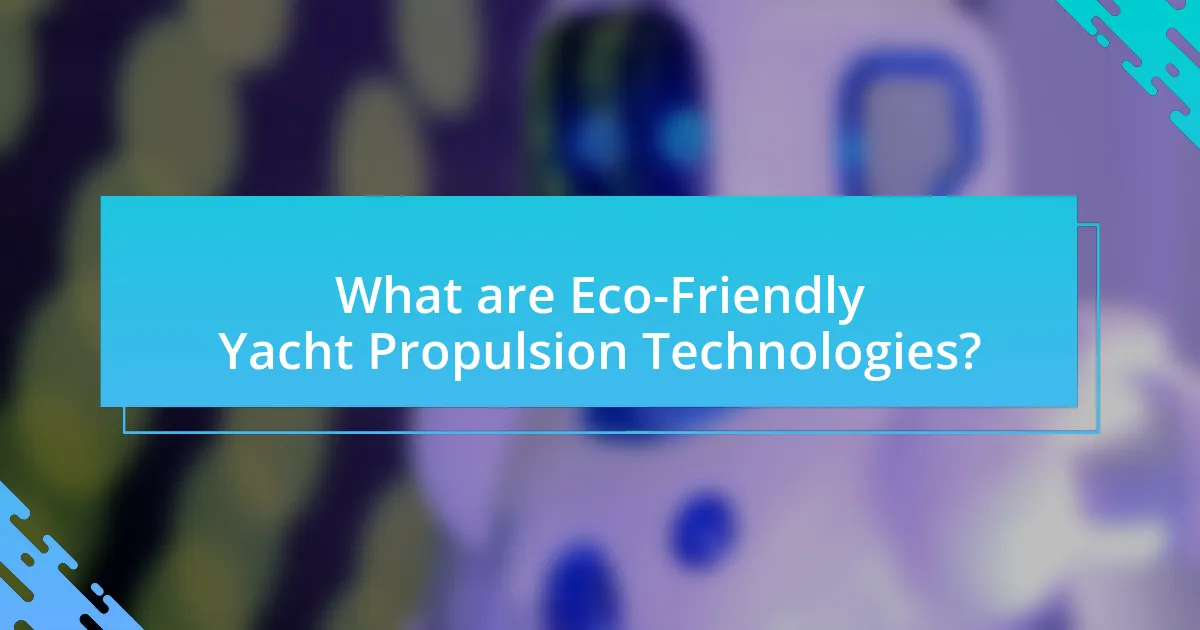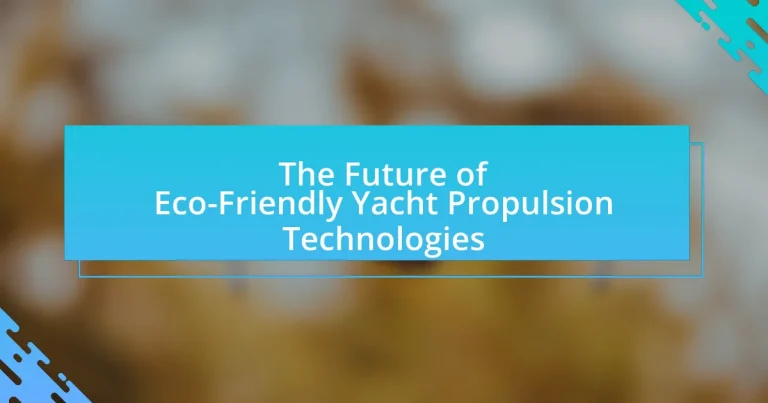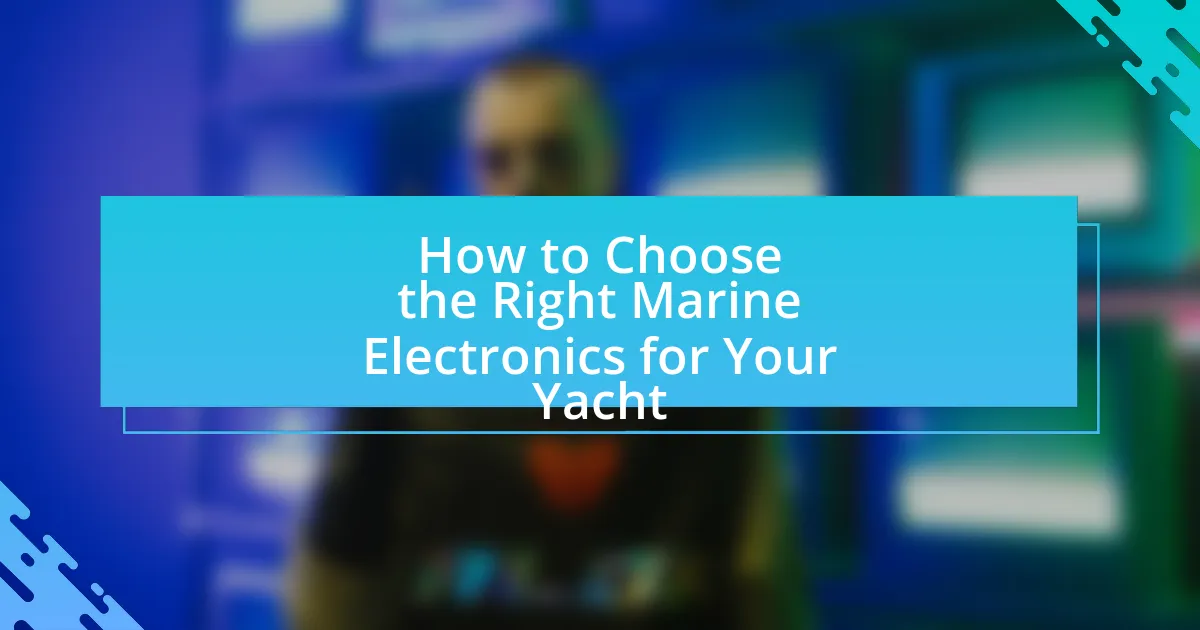The article focuses on the future of eco-friendly yacht propulsion technologies, highlighting advancements such as electric propulsion systems, hybrid systems, and alternative fuels like hydrogen and biofuels. It examines how these technologies differ from traditional propulsion methods, emphasizing their reduced environmental impact and lower emissions. Key components of eco-friendly systems, including electric motors and renewable energy sources, are discussed, along with the importance of transitioning to sustainable practices in the maritime industry. The article also addresses current trends, challenges, and the role of consumer demand in shaping the adoption of these innovative technologies.

What are Eco-Friendly Yacht Propulsion Technologies?
Eco-friendly yacht propulsion technologies include electric propulsion systems, hybrid systems, and alternative fuels such as hydrogen and biofuels. Electric propulsion systems utilize batteries to power electric motors, significantly reducing emissions and noise pollution. Hybrid systems combine traditional internal combustion engines with electric motors, allowing for reduced fuel consumption and lower emissions during operation. Additionally, hydrogen fuel cells produce electricity through a chemical reaction, emitting only water vapor, while biofuels derived from renewable sources can replace conventional fossil fuels, further decreasing the environmental impact of yachting. These technologies are increasingly being adopted in the maritime industry to promote sustainability and reduce the carbon footprint of recreational boating.
How do these technologies differ from traditional propulsion systems?
Eco-friendly yacht propulsion technologies differ from traditional propulsion systems primarily in their energy sources and environmental impact. Traditional systems typically rely on fossil fuels, which emit greenhouse gases and contribute to pollution, while eco-friendly technologies often utilize renewable energy sources such as solar, wind, or hydrogen fuel cells, significantly reducing emissions. For instance, hydrogen fuel cells produce only water vapor as a byproduct, contrasting sharply with the carbon emissions from diesel engines. Additionally, eco-friendly systems often incorporate advanced energy management systems that optimize efficiency, further distinguishing them from conventional propulsion methods that lack such innovations.
What are the key components of eco-friendly propulsion systems?
The key components of eco-friendly propulsion systems include electric motors, renewable energy sources, energy storage systems, and advanced control systems. Electric motors provide efficient and low-emission power, while renewable energy sources such as solar panels and wind turbines harness natural energy to reduce reliance on fossil fuels. Energy storage systems, like batteries or supercapacitors, store energy for use when needed, enhancing system efficiency. Advanced control systems optimize energy use and manage propulsion effectively, ensuring minimal environmental impact. These components collectively contribute to reducing greenhouse gas emissions and promoting sustainable marine transportation.
How do these components contribute to sustainability?
Eco-friendly yacht propulsion technologies contribute to sustainability by reducing greenhouse gas emissions and minimizing environmental impact. These components, such as electric engines, hybrid systems, and renewable energy sources like solar and wind, significantly lower fuel consumption compared to traditional diesel engines. For instance, electric propulsion systems can reduce emissions by up to 90%, as reported by the International Maritime Organization. Additionally, the use of lightweight materials in yacht construction enhances energy efficiency, further supporting sustainable practices in marine transportation.
Why is the shift towards eco-friendly propulsion important?
The shift towards eco-friendly propulsion is important because it significantly reduces greenhouse gas emissions and minimizes environmental impact. Traditional propulsion systems, primarily reliant on fossil fuels, contribute to air and water pollution, harming marine ecosystems and accelerating climate change. For instance, the International Maritime Organization reported that shipping accounts for approximately 2.5% of global greenhouse gas emissions. Transitioning to eco-friendly alternatives, such as electric or hybrid systems, can lower these emissions and promote sustainable practices in the maritime industry. This shift not only aligns with global climate goals but also enhances the long-term viability of marine resources.
What environmental impacts are associated with traditional yacht propulsion?
Traditional yacht propulsion primarily relies on fossil fuels, leading to significant environmental impacts such as greenhouse gas emissions, water pollution, and marine ecosystem disruption. The combustion of diesel or gasoline in yacht engines releases carbon dioxide, contributing to climate change, with recreational boating accounting for approximately 1% of total U.S. greenhouse gas emissions. Additionally, oil spills and fuel leaks can contaminate marine environments, harming aquatic life and degrading water quality. Noise pollution from engine operation can disrupt marine wildlife communication and behavior, further threatening biodiversity.
How do eco-friendly technologies mitigate these impacts?
Eco-friendly technologies mitigate environmental impacts by reducing emissions and enhancing energy efficiency in yacht propulsion systems. For instance, electric propulsion systems eliminate harmful exhaust emissions, while hybrid systems combine traditional fuel with renewable energy sources, significantly lowering carbon footprints. According to a study by the International Maritime Organization, transitioning to cleaner technologies can reduce greenhouse gas emissions from maritime transport by up to 30% by 2030. Additionally, advancements in solar and wind energy integration allow yachts to harness renewable resources, further decreasing reliance on fossil fuels and minimizing ecological disruption.
What are the current trends in eco-friendly yacht propulsion technologies?
Current trends in eco-friendly yacht propulsion technologies include the increasing adoption of hybrid systems, electric propulsion, and the use of renewable energy sources such as solar and wind power. Hybrid systems combine traditional internal combustion engines with electric motors, allowing for reduced emissions and improved fuel efficiency. Electric propulsion is gaining traction due to advancements in battery technology, enabling longer ranges and faster charging times. Additionally, solar panels and wind turbines are being integrated into yacht designs to harness renewable energy, further decreasing reliance on fossil fuels. These trends reflect a broader industry shift towards sustainability and compliance with stricter environmental regulations.
Which technologies are leading the market today?
The leading technologies in the market today for eco-friendly yacht propulsion include electric propulsion systems, hybrid propulsion systems, and hydrogen fuel cells. Electric propulsion systems utilize batteries to power electric motors, significantly reducing emissions and noise, while hybrid systems combine traditional engines with electric motors for improved efficiency. Hydrogen fuel cells generate electricity through a chemical reaction, offering a zero-emission alternative. According to a report by the International Maritime Organization, the adoption of these technologies is crucial for meeting global emissions targets and enhancing sustainability in the maritime industry.
How are advancements in battery technology influencing yacht propulsion?
Advancements in battery technology are significantly enhancing yacht propulsion by enabling longer ranges, faster charging times, and reduced weight. Modern lithium-ion batteries, for instance, offer higher energy densities, allowing yachts to operate more efficiently and with less environmental impact. According to a report by the International Maritime Organization, the integration of advanced battery systems can reduce greenhouse gas emissions by up to 30% in marine applications. Additionally, innovations such as solid-state batteries promise even greater safety and performance, further driving the shift towards electric and hybrid propulsion systems in the yachting industry.
What challenges do eco-friendly yacht propulsion technologies face?
Eco-friendly yacht propulsion technologies face significant challenges, including high initial costs, limited infrastructure, and technological limitations. The high costs associated with developing and implementing these technologies can deter yacht manufacturers and owners from adopting them, as they often require substantial investment compared to traditional propulsion systems. Additionally, the lack of widespread refueling or charging infrastructure for alternative fuels and electric systems limits their practicality for long-distance voyages. Furthermore, current battery technology and energy density present constraints on the range and performance of electric propulsion systems, making them less competitive with conventional engines. These challenges hinder the broader adoption of eco-friendly propulsion technologies in the yacht industry.
What are the economic barriers to adopting these technologies?
The economic barriers to adopting eco-friendly yacht propulsion technologies include high initial investment costs, limited availability of financing options, and the uncertainty of return on investment. High initial costs can deter yacht manufacturers and owners from transitioning to these technologies, as they often require significant capital for research, development, and implementation. Limited financing options further exacerbate this issue, as traditional lenders may be hesitant to fund projects perceived as risky or unproven. Additionally, the uncertainty of return on investment arises from fluctuating fuel prices and the evolving regulatory landscape, making it difficult for stakeholders to predict long-term financial benefits. These factors collectively hinder the widespread adoption of eco-friendly propulsion technologies in the yacht industry.
How do regulatory frameworks impact the development of eco-friendly propulsion?
Regulatory frameworks significantly influence the development of eco-friendly propulsion by establishing standards and incentives that drive innovation and compliance. These frameworks, such as the International Maritime Organization’s (IMO) regulations on greenhouse gas emissions, compel manufacturers to invest in cleaner technologies to meet stringent environmental targets. For instance, the IMO’s 2020 sulfur cap has led to increased research and development in alternative fuels and propulsion systems, such as hydrogen and electric propulsion, which are essential for reducing the carbon footprint of yachts. Furthermore, government incentives for adopting sustainable technologies can accelerate the market adoption of eco-friendly propulsion solutions, as seen in various countries that offer tax breaks or subsidies for green technology investments.
How can yacht manufacturers and owners transition to eco-friendly propulsion?
Yacht manufacturers and owners can transition to eco-friendly propulsion by adopting electric or hybrid propulsion systems that utilize renewable energy sources. Electric propulsion systems, powered by batteries or fuel cells, significantly reduce greenhouse gas emissions and reliance on fossil fuels. Hybrid systems combine traditional engines with electric motors, allowing for greater fuel efficiency and reduced emissions during operation.
The International Maritime Organization (IMO) has set targets to reduce greenhouse gas emissions from shipping by at least 50% by 2050, which underscores the urgency for yacht manufacturers and owners to adopt these technologies. Additionally, advancements in battery technology, such as lithium-ion batteries, have improved energy density and reduced costs, making electric propulsion more viable for yachts.
Furthermore, integrating solar panels and wind turbines can supplement energy needs, enhancing the sustainability of yacht operations. The shift towards eco-friendly propulsion not only aligns with global environmental goals but also meets the growing consumer demand for sustainable luxury experiences in the yachting industry.
What best practices should be followed during the transition?
Best practices during the transition to eco-friendly yacht propulsion technologies include conducting thorough feasibility studies, engaging stakeholders early, and implementing pilot projects. Feasibility studies assess the technical and economic viability of new technologies, ensuring informed decision-making. Engaging stakeholders, such as yacht owners, manufacturers, and regulatory bodies, fosters collaboration and addresses concerns, which is crucial for successful adoption. Pilot projects allow for real-world testing of new propulsion systems, providing valuable data and insights that can guide further implementation. These practices are supported by industry reports indicating that stakeholder engagement and pilot testing significantly enhance the success rates of technology transitions in maritime sectors.
How can stakeholders collaborate to promote eco-friendly technologies?
Stakeholders can collaborate to promote eco-friendly technologies by forming partnerships that leverage their unique resources and expertise. For instance, yacht manufacturers can work with environmental organizations to develop sustainable materials and propulsion systems, while governments can provide incentives for research and development in eco-friendly technologies. Collaborative initiatives, such as joint ventures or public-private partnerships, can facilitate the sharing of knowledge and best practices, leading to innovative solutions. Evidence of successful collaboration can be seen in the maritime industry, where companies like Siemens and the Port of Rotterdam have partnered to implement green technologies, resulting in reduced emissions and improved energy efficiency.
What future innovations can we expect in eco-friendly yacht propulsion?
Future innovations in eco-friendly yacht propulsion will likely include advancements in hydrogen fuel cells, electric battery technology, and hybrid systems that combine renewable energy sources. Hydrogen fuel cells are gaining traction due to their ability to produce zero emissions while providing significant power output, as demonstrated by projects like the Energy Observer, which has successfully utilized hydrogen for marine propulsion. Electric battery technology is also evolving, with improvements in energy density and charging times, making electric yachts more viable for longer journeys. Additionally, hybrid systems that integrate solar panels and wind turbines with traditional engines are being developed to enhance energy efficiency and reduce reliance on fossil fuels, as seen in the latest models from manufacturers like Silent Yachts. These innovations reflect a growing commitment to sustainability in the maritime industry, driven by regulatory pressures and consumer demand for greener alternatives.
How might emerging technologies reshape the industry?
Emerging technologies will reshape the eco-friendly yacht propulsion industry by enabling the development of more efficient and sustainable propulsion systems. Innovations such as electric and hybrid engines, fuel cells, and renewable energy sources like solar and wind power are being integrated into yacht designs, significantly reducing carbon emissions and fuel consumption. For instance, the adoption of lithium-ion batteries in electric propulsion systems has shown to decrease operational costs and enhance performance, as evidenced by the increasing number of manufacturers producing electric yachts. Additionally, advancements in materials science, such as lightweight composites, contribute to improved energy efficiency and overall vessel performance. These technological shifts not only align with global sustainability goals but also cater to a growing consumer demand for environmentally responsible boating options.
What role will consumer demand play in the evolution of these technologies?
Consumer demand will significantly influence the evolution of eco-friendly yacht propulsion technologies by driving innovation and adoption. As consumers increasingly prioritize sustainability, manufacturers are compelled to develop and enhance propulsion systems that minimize environmental impact, such as electric and hybrid engines. For instance, a report from the International Maritime Organization indicates that the demand for greener technologies in maritime industries is rising, with a projected market growth for electric propulsion systems expected to reach $10 billion by 2025. This shift in consumer preferences not only encourages investment in research and development but also leads to competitive pricing and improved performance of eco-friendly options, ultimately shaping the future landscape of yacht propulsion technologies.
What practical steps can yacht owners take to adopt eco-friendly propulsion technologies?
Yacht owners can adopt eco-friendly propulsion technologies by retrofitting their vessels with hybrid or electric propulsion systems. These systems reduce reliance on fossil fuels and lower emissions, contributing to environmental sustainability. For instance, the use of electric motors powered by renewable energy sources, such as solar panels or wind turbines, can significantly decrease a yacht’s carbon footprint. Additionally, yacht owners can invest in advanced battery technologies, like lithium-ion batteries, which offer higher efficiency and longer life cycles compared to traditional lead-acid batteries. According to a report by the International Maritime Organization, transitioning to cleaner propulsion methods can reduce greenhouse gas emissions from maritime activities by up to 30% by 2030.
















